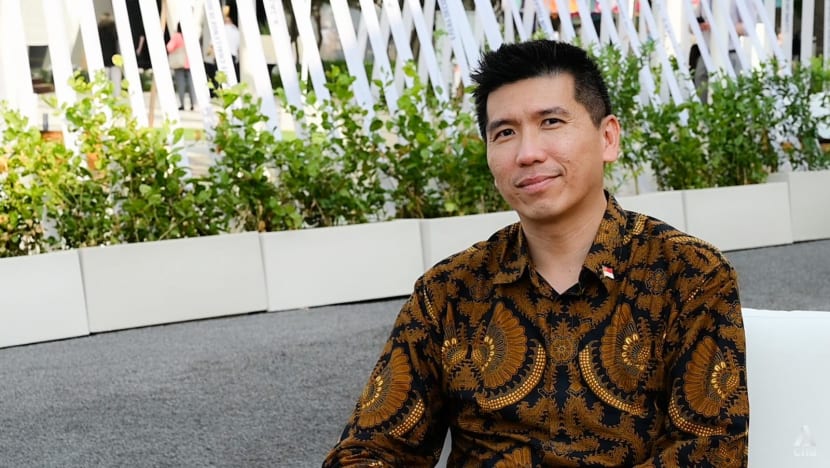COP28: Winston Chow, the ‘boy from Bedok’ leading global climate research by leveraging his Singapore upbringing
The climate scientist is the first Singaporean elected to the United Nations’ top climate body as the IPCC’s Co-Chair of Working Group II. He shares with CNA his views on the COP28 talks and the climate change challenge.

Winston Chow was appointed to a senior role with the IPCC in July, 2023. (Photo: Jack Board/CNA)

This audio is generated by an AI tool.
DUBAI: Associate Professor Winston Chow laughs as he recalls how it was his brothers that made him become what he is today.
That is, one of Singapore’s most influential climate scientists and leading top minds from around the world in the daunting task of better understanding and communicating climate change.
“I’m a Singapore boy. I grew up in the East Coast, born and bred in Bedok. Thanks to my brothers, they are in a way the inspiration for me because they kept badgering me: why is Singapore so hot?
“And that was the reason why I became a scientist in the first place,” he told CNA on the sidelines of top-level climate talks at the 28th Conference of the Parties (COP28) in Dubai.
Usually clad in his colourful batik shirts, Assoc Prof Chow brings a light-hearted edge to a serious undertaking. He holds a prestigious role within the United Nations’ top climate science body - the Intergovernmental Panel on Climate Change (IPCC).
In July, he was elected as co-chair of IPCC’s Working Group II on Impacts, Adaptation and Vulnerability.
Under his guidance, the group publishes special reports, holds expert meetings and eventually will help prepare the IPCC’s full assessment reports and synthesis publications, which are considered the leading publications on how climate change is impacting the planet.
“We'll be busy for the next five to seven years,” he said. The role is full-time but unpaid, a deliberate system that ensures leading scientists are clear from any outside influence.
So, amid juggling an international team and attending negotiations like COP28, Assoc Prof Chow continues to lecture the next generation - his students at Singapore Management University, where he is a Lee Kong Chian Research Fellow.
SINGAPORE GROUNDING AND EXPERIENCE
An urban heat specialist, Assoc Prof Chow’s leadership position with the IPCC gives him influence over the direction of much research on critical topics.
During his tenure, he said he wants to prioritise the focus on the Global South - including many parts of Southeast Asia - where there are many gaps left in data and knowledge about climate impacts.
He believes his Singapore background and experience are assets in understanding what solutions work and how to translate that knowledge to vulnerable communities.
“Living and researching in a city-state, like Singapore, which is at the vanguard of climate research of good action for adaptation and mitigation, helps give me that grounding to understand the solutions that can help,” he said.
“Being from a region that will be rapidly urbanising over the next 30 years and that will double in effective population by the middle of this century, you're going to have a lot of people who will be exposed to climate change, and they’ll be hungry and they’ll be very actively looking out for these solutions that can work.”
As well, he wants scientists to be able to bridge the gap between the data and research and the decision-makers and the general public. Communicating with cut-through is a top priority.
“We need to communicate better,” he admitted.“We're looking for graphic designers and communication specialists to try and translate effectively what us scientists are oftentimes so enmeshed with, all into something people on the street and policymakers can quickly grasp and then put into action.”
REFLECTIONS ON COP28
Debate has raged in COP28 about the role of the United Arab Emirates holding the leadership position and setting the agenda for negotiations.
Many have criticised Sultan Al Jaber - the COP president - for continuing as the head of the country’s powerful state oil company. He also faced scrutiny for saying there was “no science” to support a phaseout of oil and gas, during a panel discussion while the forum was ongoing.
Assoc Prof Chow said he “doesn’t envy” the position of the sultan but is blunt in his assessment that oil-producing nations need to be part of the climate solution, despite “contributing immensely” to the problem.
“He has a lot of influence. This is his show. And he's also under pressure to deliver a very strong COP result. He's been assailed from all different sides,” he said.
“We cannot exclude that industry from the negotiation table, and he's trying to tread that fine line and fingers crossed that, for all our sakes, he'll be able to do so.”
While the outcome - and success - of the talks in Dubai are yet to be determined, Assoc Prof Chow remains optimistic about the chances of a “powerful outcome”, which the UAE presidency has promised.
Regardless of the conclusions reached by world leaders, his job will remain the same: learn more and explain it in ways that promote progress. For a boy from Bedok, much weight has fallen onto his shoulders.
“The pressures are there, but I'm a bit fearful of that pressure,” he said. “It's a big responsibility. But if you're not scared of something, you're not serious enough about it.”















